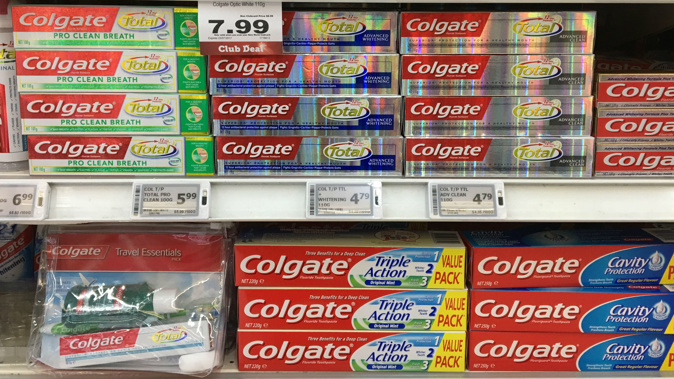
Enthusiastic tooth brushers are being warned to stay away from Colgate Total toothpaste, or at least to use it sparingly.
The toothpaste is one of the few toiletries in New Zealand that still uses triclosan, an antibacterial that was once commonly found in soaps, toothpastes and body washes.
That was until September last year, when the US Food and Drug Administration banned it from soap because of possible health risks.
Triclosan has been linked to changes in hormone function, liver and kidney damage, and is a suspected carcinogen.
Consumer NZ researcher Jessica Wilson said the FDA ruling had seen it quickly disappear from many toiletry products, but not all.
"The publicity on triclosan has prompted manufacturers to start removing it from their products, so we have seen it disappearing from handwashes.
"However, it's still used in everything from hand soaps to toothpaste, and it's permitted to be used in our cosmetics at a concentration of 0.3 per cent."
One of the most commonly available products containing it is Colgate Total toothpaste.
The antibacterial agent can be useful for fighting diseases such as gingivitis, but Wilson said it wasn't needed for everyday use.
/arc-anglerfish-syd-prod-nzme.s3.amazonaws.com/public/U23GB4AMUFFG7MYHONIPWBWZFM.jpg)
Colgate Total still contains triclosan, but Consumer says it shouldn't be used daily. Photo / Frances Cook.
"Our main concern is that it's being used in products where it doesn't need to be used.
"Triclosan's a very broad spectrum product, and given its environmental effects and potential health effects, regulators really need to be taking a precautionary approach.
"If there are no good reasons for you to be using this every day, avoid. Unless you've been advised by a medical practitioner that this is the best option.
"Otherwise, this isn't a good choice for everyday use."
Last year, the Environmental Protection Authority received an application to check if triclosan's use in New Zealand products should be reassessed.
In a statement, the EPA said it had found there were grounds for changing our approach to the "hazardous substance" of triclosan, but that nothing had happened since then.
The EPA statement said there would need to be another external request for the changes to be made, and whoever made the request would need to partially fund the research to guide those changes.
The Foodstuffs supermarket chain runs brands including Pak n' Save and New World.
In a statement, the company said after the FDA ruling last year it contacted suppliers, and asked them whether they were using triclosan in their antibacterial products.
"We received two types of response. Suppliers either advised that their products did not contain Triclosan or any of the other ingredients listed by the FDA.
"Or if it was present, products were being reformulated by October 2017.
"The only exception is Colgate Total which has recognised benefits around the treatment of gingivitis.
"Our private label products including Pams and Value do not contain any of the ingredients listed by the FDA."
Countdown spokeswoman Kate Porter said they made the decision to remove triclosan from Countdown's own brand products some time ago, with only a few products still being reformulated.
"We're also having conversations with retail suppliers in NZ about what their position is on triclosan, and any plans they have to address concerns regarding their products."
The call was backed by New Zealand scientists including Cawthron environmental toxicologist Dr Louis Tremblay.
Studies on lab animals have shown a link between triclosan and hormone disruption, leading to problems including infertility, impaired brain development, and impaired heart function.
The FDA has also noted a link to the overuse of triclosan, and the rise of antibiotic-resistant bacteria.
Colgate-Palmolive has been contacted for comment, and has not yet responded.
Take your Radio, Podcasts and Music with you









